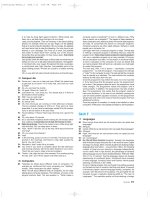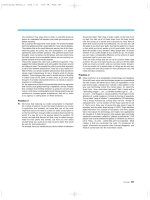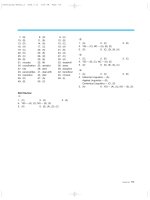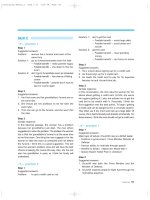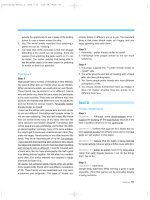Tài liệu Developing skills for the toefl ibt transcript part 1 pptx
Bạn đang xem bản rút gọn của tài liệu. Xem và tải ngay bản đầy đủ của tài liệu tại đây (73.42 KB, 10 trang )
Beginning READING
Developing Skills for the TOEFL
®
iBT
TRANSCRIPTS
Listening Section / Speaking Section / Writing Section
Developing-4Books_5 2006.7.13 3:48 PM Page 655
Listening
656
Transcripts
C
hapter
1
Skill A
01 Campus Life
W: Hey, Barry. Do you have a second?
M: Sure, what’s up?
W: I’m looking for more people to join our basketball team.
M: Really? Is it a team for a league?
W: Yeah. There is a co-ed intramural sports league here at the college.
Anybody can sign up. Some of my friends and I want to form
a basketball team.
M: How many people do you need?
W: We need at least eight people---four men and four women.
M: How many people do you have at the moment?
W: We have six. So, we need two more people to form the team.
We have enough women. We just need two more men.
M: Sure, I’ll sign up.
02 Communication
W: Many theories and models about speech and communication
exist. Today, I will introduce you to one model, the transactional
model. Remember, this is only one model of many. Let’s begin
with a few of the transactional model’s characteristics.
First, as people, we try to create messages using all the stimuli
(or information) from our present and past. That is, we learn
information as both children --- the past --- and as adults --- the
present. The amount of information we take in is controlled by
something we call “filters.” These filters mean we take in only
some information, or keep what is important to know. So, any
messages we create are a result of all this information that we
receive and filter, from the time we are children to adults.
03 Campus Life
W: I’m new here. Could you explain how to get copies made here
in the library?
M: Sure! First thing to know is that all copying is self service. That
means you do your own copying. Unless, of course, you have
special needs, like some kind of special copying job. Then, you
can get assistance from the reference desk.
W: OK, got it! Self service or go to the reference desk if I have a
special copying job.
M: Machines are located on the 4
th
and 5
th
floors. Select your copier,
load your originals into the machine, and insert your student ID
or virtual cash card.
W: I understand. Self service, 4
th
and 5
th
floors, load the originals, and
pay.
M: Exactly! Just don’t forget to hit copy!
04History
M: Today, we will discuss the king of Macedonia. Most of you
probably know him as Alexander the Great. Born in 356 BC,
this king of Macedonia is considered one of the greatest military
leaders in history. He conquered much of the civilized world that
existed during his lifetime.
Let’s talk about the wars Alexander the Great led. These are
perhaps his greatest legacy, or memory. After his father, King Phillip
II, died, Alexander continued with his father’s plan to take over
Persia. Alexander’s wars against the Persians were successful. His
success resulted in the creation of a huge empire made up of the
regions Macedonia, Egypt, Syria, Persia, and Asia Minor.
05 Campus Life
M: Suzy, do you know if pets are allowed in the dorm?
W: Well, certain pets are allowed.
M: I really want to bring my dog to live with me.
W: I’m pretty sure that dogs are not allowed.
M: That figures. What kind of pet can we have?
W: Well, lots of people have fish.
M: Fish. Really? Why fish?
W: There are lots of reasons. They’re small. They don’t eat much,
and they’re colorful.
M: Hmmm.
W: I think you should get some fish. They won’t take up much
space. They’ll be inexpensive. They’ll also add some nice color to
your room.
M: True enough! I’ll do that.
06 Literature
M: Emily Dickinson was an important American poet. She was
born in 1830 and died in 1886. You know, many people consider
Emily Dickinson to be one of the first great American poets,
and yet, amazingly, very few of her poems were published
while she was still alive. In fact, only about 10 of her poems
were published before her death, though she actually wrote
about 1700 of them during her lifetime! Pretty amazing, isn’t
it? She wrote far more poems than were published while she
was alive. After her death, her work became more recognized.
Today, you can find tons of books on Dickinson and her poetry.
07 Ecology
W: Ecology is the study of the relationships between an organism
and its environment. The “organism” is the plant or animal that
we are observing. The “environment” refers to the organism’s
surroundings. For example, we might be studying a cactus
plant in the desert. So, our organism will be the cactus, and the
environment will be the desert. But why does our organism like
this environment? That is, why is a hot, dry desert a good place
for a cactus to live? We may also ask which other members
make up a certain type of community. For example, what other
types of plants (or animals) prefer a hot, dry desert climate?
08 Health
W: Today, I’d like to talk about infectious diseases. Have you heard
of those before? An infectious disease is a disease that a person
can get from environmental factors, that is, from the surroundings
or where he or she lives. For example, if a person drinks dirty
water, he or she can become sick. These days, infectious diseases
are not as prevalent as they were in the past. Back in the 19
th
century, they were very prevalent. For example, one widespread
problem in the 1800s was babies who got diarrhea from infections.
These infections came from drinking dirty water or drinking
unpasteurized milk. A terrible fact we know is that diarrhea
killed almost 200 out of every 1,000 infants in the year 1840.
Nearly 20 percent of babies at that time died from this particular
infectious disease.
Note: Highlighting indicates a repeated listening sample.
Developing-4Books_5 2006.7.13 3:48 PM Page 656
Transcripts
657
Skill B
01 Campus Life
W: Excuse me, do you have the time?
M: It’s 10:15.
W: Oh no! The last city bus stopped running at 10:00. How am I
going to get back to my dorm? I don’t like to walk in the dark.
M: Why don’t you just use the campus shuttle bus?
W: Is there a shuttle bus stop around here?
M: There’s one right over there. A bus should be coming soon.
They run every 15 minutes, and I saw a bus pulling away about
ten minutes ago.
W: That’s great! Does the shuttle have just one route?
M: Yeah. But it passes by each of the dorms.
W: Even Chetwood Hall?
M: Yeah. It goes there, too.
W: I never knew about the shuttle service. Thanks for telling me
about it.
02 Geology
M: In geology, a flow is defined as materials mixing together as
they move down a slope. There are three main types of flows:
creep flows, debris flows, and debris avalanches.
Remember, it does not matter about the type of flow. The basic
definition or meaning is the same: flow means materials mixing
together as they move down a slope.
Now, one of the major differences between these types of
flows---creep, debris flow, or debris avalanches---is the rate of
movement. A creep flow moves slowly. A debris flow contains
water and usually moves faster. And as you might guess, the
debris avalanche moves very quickly. Debris avalanches occur
on a steep hill or slope, so that’s why they’re faster. So, in order
to remember them, think of them from slowest to fastest:
creep flows, debris flows, and debris avalanches.
03 Campus Life
M: Will I be dropped from a class if I simply stop attending?
W: Not necessarily. Some profs might, but others won’t.
M: So, how do I drop a class officially?
W: During the first two weeks of the semester, no official application
is needed. Simply call 444-UTEL or log onto CasperWeb and take
the class off your schedule.
M: So, I can drop just by Internet or making a phone call?
W: Yes. However, later in the semester---between three and six
weeks---you will need to submit an official drop notification
form with the professor’s signature on it. You can get that form
here in the department office.
M: Oh, I see.
W: And, during the final week of the semester, no drops are allowed.
M: Since this is still the second week of classes, I can just drop over
the phone, right?
W: Right. But as of next Monday, you’ll have to fill out a drop
notification form and get your prof’s signature on it.
M: Got it. Thanks.
04 Literature
W: “Genre” is a French word that, translated literally, means type
or category. It is used in literature to refer to the group a particular
work or writing falls into. For example, two types of genre are
comedy and tragedy. If the character in a particular work---be it
a novel or play or whatever---if the character ends up in a worse
situation at the end of the story, we call it a tragedy. Hamlet is
probably the most famous or well-known tragedy.
A comedy, on the other hand, is a work in which humor is used
to entertain. In comedies, the main characters may not be great
heroes, but we find them amusing or endearing because of
their personalities. The ending of a comedy is usually happy, or
at least not tragic. A famous example of a comedy is Shakespeare’s
Twelfth Night.
We can see, therefore, that in a tragedy, the main character
ends up worse than he or she began, while in a comedy, the
main character typically improves his or her position.
05 Geography
M: Did you know that the Republic of South Africa is one of the
largest countries in Africa? It is actually home to over 44 million
people, but there is more to South Africa’s population than just
its size. Another interesting statistic about this population is
that there are more Indian people in this republic than in any
other country in Africa. In fact, currently, almost three percent
of South Africa’s population is of Indian origin. I know this might
not seem like a large number, but it is the highest percentage of
Indians in that continent. As you might expect, the majority of
the population in South Africa is black. Just over 75 percent of
the population is black. The second largest group is whites, who
number almost 14 percent of the total population.
06 Campus Life
W: Hi, Professor Smith.
M: Hi, Justine. How are you?
W: I’m OK, but I’m doing badly in your class. I am wondering how
to do better.
M: I think coming prepared to class may do something to boost
your grades.
W: How can I prepare for class?
M: Have you checked out my web page? All of my lecture notes
are on my web page. You can download the notes and read them
ahead of time.
W: Really? Wow. That would be very helpful.
M: Another good idea is to read the chapter in the book before
class.
W: I usually don’t read the chapter ahead of time. I thought hearing
the lecture first was better than reading first.
M: Reading first is actually better. You should also jot down ideas
or notes while you’re reading. That way you can come to class
with some questions.
07History
W: Most of you have heard stories or read books about pirates.
Stories about pirates are common around the world. Basically,
pirates are people who steal from others. Usually, pirates steal
while at sea. That is, they use boats to attack other people’s
boats. Pirating, though, has changed since the old days. Yes, it’s
true. There are still pirates today. I bet that surprises some of
you, but it’s true. In the old days, pirates used swords to attack
others. Besides swords, they used cannons, but today you
won’t see many pirates with swords or cannons. Today, pirates
use different weapons. They use rifles instead of swords, and
pirates don’t use sail boats like before. Today, pirates use speed
boats. Speed boats, of course, are much faster than the old sail
boats.
Developing-4Books_5 2006.7.13 3:48 PM Page 657
658
Transcripts
08 Phys. Ed.
M: One popular form of martial art is called karate. People all over
the world practice karate, many as a means of self defense.
Some practice it just for exercise. Those are just the physical
aspects of karate: defense and exercise, but karate does not
only help you learn to defend yourself and become stronger. In
fact, many people say that learning karate also helps a person
psychologically. For example, a person must learn to deal with
stress during practice. We experience stress in our mind, so it is
psychological. Learning to handle stress can be helpful in everyday
situations. As a person practices karate, he or she deals with
stress. The ability to deal with stress can help in our lives every day.
Skill C
01 Sociology
W: Today I want to introduce you to the concept of culture. We all
recognize that each country has its own unique culture, but let’s
start by looking at some of the major characteristics of culture.
We’ll begin with what I consider to be the three most important
characteristics, in order of importance.
First, only human beings have culture. A group of gorillas or
monkeys would not be considered to have their own culture. It
is something unique to humans. Secondly, culture exists in the
minds of individuals. In other words, it is learned behavior. It is
the things that we---that is a group of people---consider normal.
For example, the clothes that I’m wearing now are a product of
my culture and what I think is normal.
So, culture is unique to humans, and it exists in the mind. Third,
cultures are different. No two cultures are the same. For example,
England and Pakistan would be two very different cultures. People
from England and Pakistan have different ideas and different
behaviors even in simple things like how women dress.
02 Campus Life
M: Hi, Susan. How are you today?
W: I’m confused.
M: All right. How can I help you?
W: According to the university catalog, I need to take two semesters
of a foreign language.
M: Yes, that’s right. All undergraduate students are required to take
two foreign language courses.
W: But I already studied Spanish in high school.
M: Oh. How many Spanish classes did you take?
W: I took four years of high school Spanish courses.
M: In that case, you may not need to take two semesters here.
W: Really?
M: You can take a placement test. If you get a high test score, you
can place out of the first semester of Spanish. You will only need
to take one semester.
03 Physics
M: We know that the Earth rotates very quickly. In fact, right now
it is rotating at a speed of 1,100 miles per hour. But what would
happen if the Earth stopped going around? Considering how
fast the Earth rotates, a sudden stop would be terrible. Everything
on the planet would fly away into the atmosphere. Basically,
nothing that we care about would be left on the planet.
It’s hard to imagine and highly unlikely that the Earth would just
stop one day, but what if we imagine that the Earth gradually
stopped rotating? In that case, as the Earth gradually began to
spin more slowly, we would notice that our daylight cycle
would change. Then, we would all have a situation like people
living near the North Pole. For example, we could have several
weeks of darkness and then several weeks of daylight.
04 Ecology
W: Today in this lecture, we will talk a little about the “water cycle.”
This is the movement of water on the planet. Take the ocean as
a starting place. Warm weather around oceans causes some of
the water to evaporate. When that water evaporates, it becomes
mixed in the air as gas. Now, this water will eventually return
to the land, but how does this happen? By rain and snow.
Some of that rain and snow gets back into rivers, streams, and
the ocean. Some of the water also goes into the ground. Any
idea what this is called? Quite simply, we call it “ground water.”
Now, this ground water isn’t trapped where it falls. Even ground
water eventually reaches the ocean again. It just circulates through
underground cracks or chambers until it gets back to rivers,
streams, or the ocean, completing the cycle.
05 Campus Life
M: The name of this course is History 101. It will be delivered primarily
by lecture. Some audio-visual materials will be included as well,
and, of course, there will be a textbook.
W: Excuse me, professor?
M: Yes?
W: So, the course format will include lectures, audio-visual materials,
and a text book. Will we have formal discussions, too?
M: Formal discussions will not be scheduled due to the size of the
class, but questions in class are always welcome.
W: Great! So, there will be some opportunity for discussions during
the lectures?
M: Yes, that’s right. I’m always open to questions about things any
of you might have difficulty understanding.
06 Campus Life
M: Hello. I need a copy of my grades.
W: Oh, you mean a transcript.
M: Yes, right. A transcript. I need a list of my grades for my application
to graduate school.
W: Do you need an official transcript or an unofficial transcript?
M: What’s the difference?
W: Well, both have the same information, but an official transcript
has the official stamp of the university. The unofficial transcript
only has the grades.
M: Is there a charge for the transcript?
W: Only for the official one. It costs four dollars. Unofficial transcripts
are free.
M: I’ll probably need the official transcript for my application.
W: OK. Please fill out this transcript request. Would you like a free,
unofficial one for yourself?
M: Sure, thanks.
07 Health
M: So class, let’s quickly review some of the facts we learned about
vitamin D. We know it is important for the body. It works to help
the body use calcium. In that way, vitamin D helps the body to
Developing-4Books_5 2006.7.13 3:48 PM Page 658
Transcripts
659
build strong bones. It also helps strengthen teeth --- which are also
bones, by the way. So, building strong bones and strengthening
teeth is an important effect of vitamin D. Now, can anyone tell
me a source of vitamin D? Yes?
W: We can buy vitamin D supplements from the store.
M: Right, that’s one way, but there is a much cheaper way to get
it! We can get it from the sun for free. Our skin converts sunlight
into vitamin D, so just walking in the sun will help the body get
this important vitamin.
08 Social Science
W: Today, it is common for countries to take a census. What is a
census? A census is a count of the population of a country.
Officials are interested to know how many people live in the
country. They want to count all the men, women, and children.
In addition to the number of people, officials like to know where
the residents come from. Were the residents born in that country
or were the people born in a different country? Another important
aspect of the census is determining what languages people
speak at home. For instance, do people speak Spanish at home?
Do they speak some other language? In sum, counting the number
of people, where they are from, and what language they speak are
important aspects of the census.
Chapter 1
S
kill
R
eview
A-C
01 Campus Life
M: Hi, Lisa! I’m trying to get organized for my move into the dorm
next week. Do you have some time to spare? I’d love to hear
your words of wisdom about dorm living, and what I need to
bring to feel at home in the residence.
W: Sure thing, John! Dorm living is a blast! And it’s even better if
you’re surrounded with all the right stuff. So, what do you
want to know?
M: Let’s start with clothing. What do most of the students wear?
Is the campus pretty casual, or are there opportunities to dress
up on occasion?
W: Well, this is what worked for me last year. I brought mostly
casual. You know, jeans, T-shirts, and shorts. And one or two
nice things in case there was a fancy event on campus.
M: OK, sounds good. Mostly casual...jeans, T-shirts, and shorts and
one or two nicer things.
W: Remember to bring an iron. There is usually one in each laundry
room, but they don’t usually work well. You will end up scorching
your clothes.
M: Hmmm. I’ve never ironed anything in my life. My mom always
did that. I guess it’s time I learned, though.
W: It sure is! The next thing I would look at is bedding. The residence
provides bedding, but it is not very nice.
M: So, you recommend that I pack my own sheets, pillow, and
bedspread?
W: Yes, sheets, pillow, and bedspread. Also, don’t forget some
nice towels. The dormitory towels are awful.
M: OK, towels, too. We have clothing and bedding covered. What
else do you think I need for the bathroom?
W: Well, you know that the showers are common. So, all the other
guys on your floor of the dorm are going to be using the same
showers. Bring flip flops for the shower, and your usual toiletries.
M: Flip flops for the showers. Got it!
W: Do you like coffee?
M: Sure do! Love my java in the morning.
W: Well, you might want to invest in a small coffee maker. It’s a
nice luxury having brewed coffee first thing in the morning. So,
we’ve covered clothing, bedding, bathroom, and coffee. What
about school supplies?
M: Well, I am going to need all that stuff, you know --- notebooks,
a stapler, pens, pencils --- the usual. Is there a store on campus
that sells that stuff?
W: Definitely, and it’s dirt cheap.
M: OK, clothing, bedding, shower, and coffee. You have been a
great help, Lisa. I’d better get packing. Thanks!
02 Writing
W: Let’s talk a little more about writing academic essays. As you
already know, writing an academic paper is very important for
all college students. In fact, many of your assignments will involve
writing a paper. In general, a typical college essay will be about
three hundred words long. But a good essay isn’t just about
having the correct number of words or pages. There are other
important factors. For example, an essay must have an introduction.
Besides an introduction, the essay should have body paragraphs.
And of course, you need a conclusion.
But today let’s focus on the first part of the essay, the introduction.
As I have mentioned before, the introduction is perhaps the most
important part of the essay. Why is the introduction so important?
The basic answer is that it is the first thing that a reader will see.
For that reason, an introduction must be both interesting and
informative. If the intro is not interesting, the reader may not be
willing to continue reading. Similarly, if the intro is not informative,
the reader may feel confused about the topic of the essay.
Since students often have difficulty writing introductions, let’s
talk about some of the dos and don’ts of intros.
Let’s begin with what you should not do in an intro. One thing to
avoid is beginning with what we call “cinema scopes.” Have you
ever heard of a “cinema scope”? A cinema scope attempts to give
a wide overview of the subject in one line. For example, an intro may
begin with a line like “Throughout history man has done something.”
These types of intros sound clichéd and are uninteresting. Another
thing to avoid in your introductions is beginning with a direct
quote --- for example, an intro beginning by saying: “According to
Brown...” Why avoid quoting someone else to begin your paper?
The main reason is that professors like to hear the voice of the
student first. So beginning with your own words and descriptions
is nicer than using a quote from someone else.
So what should you do in your introduction? The first thing to
do is to imagine yourself as the reader. That is, if you were reading
this paper, what would you like to see? What would be interesting
for you? What would capture your attention? By picturing yourself
as the reader, you are actually testing the quality of your intro
as you write it. Secondly, an introduction should always give the
reader some context about the paper. That is, the intro should
clearly state the topic of the paper. So if the topic of your paper
is popular sports in the US, you should give some details about
sports in the US. For example, how many sports are there? Of
all those sports, which are the most popular? How do we know
they are popular? Do some sports have more fans than others?
Give the reader some context and statistics regarding your topic.
Developing-4Books_5 2006.7.13 3:48 PM Page 659


